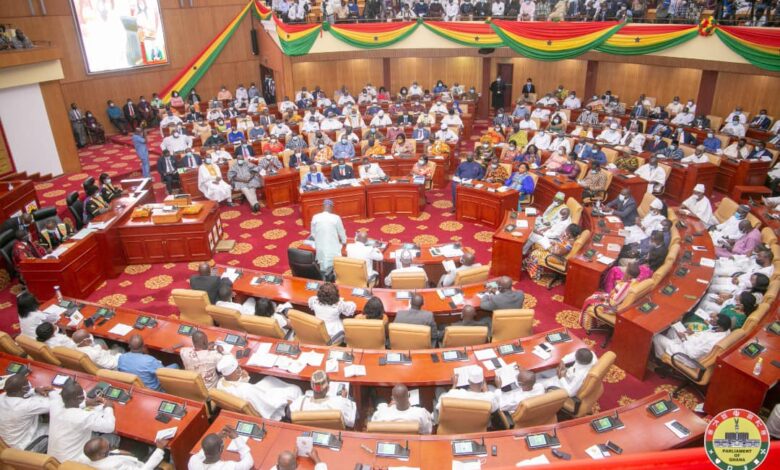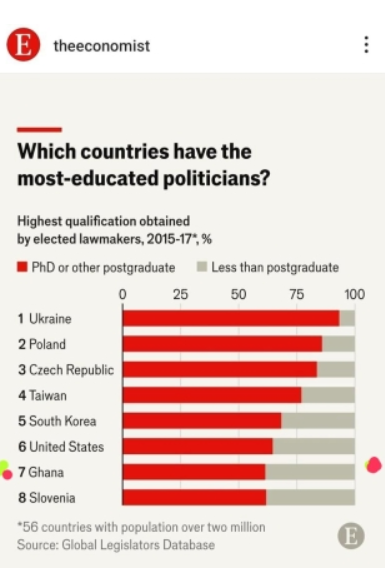Ghana Ranks Seventh in Global List of Countries with Most Educated Politicians
Ghana Ranks Seventh in Global List of Countries with Most Educated Politicians

- Ghana ranks seventh in a recent assessment of countries with the most educated politicians
- This analysis is based on two studies conducted by researchers from global universities
- Ukraine emerged with the highest proportion of legislators holding postgraduate degrees, with nearly a quarter having doctorates
Ghana ranks seventh in a recent assessment of countries with the most educated politicians, according to an article analyzing the educational backgrounds of elected officials.
This analysis is based on two studies conducted by researchers from global universities, utilizing data from 2015, 2017, and 2023, drawn from the Global Legislators Database, which evaluated 56 countries with populations over two million.
The study highlights the highest qualifications achieved by elected lawmakers, showing a significant percentage with PhDs or other postgraduate degrees.
Leading the list is Ukraine, followed by Poland in second place and the Czech Republic in third. Taiwan is in fourth, South Korea fifth, the United States sixth, and Ghana seventh, with Slovenia rounding out the top eight.

Published by The Economist, the report provides insight into the educational demographics of national parliaments. Political scientists have traditionally focused on metrics like the average age of representatives (currently 51) and the proportion of women (27%), but have faced challenges in analyzing educational qualifications across countries.
Two datasets released in late 2023 help illuminate this issue. The first study, conducted by researchers from six universities, compiled biographical data on nearly 20,000 parliamentarians from 97 countries between 2015 and 2017.
This comprehensive analysis revealed that 78% of parliamentarians held at least a bachelor’s degree, and 40% had postgraduate qualifications—figures significantly higher than the global average education levels, which stand at 35% in wealthy nations and 15% in poorer ones.
Ukraine emerged with the highest proportion of legislators holding postgraduate degrees, with nearly a quarter having doctorates. Since gaining independence in 1991, all Ukrainian presidents except Volodymyr Zelenskyy have claimed doctoral degrees. Other countries with highly educated legislators include South Korea, where about a third hold doctorates, and the United States, where over two-thirds possess postgraduate degrees.
Conversely, some countries, like Italy, Norway, and the UK, feature a notable number of parliamentarians with only secondary education. For instance, UK House of Commons Speaker Sir Lindsay Hoyle did not attend university, and prominent Italian politicians such as Luigi Di Maio and Matteo Salvini dropped out of higher education.
The second study, conducted in 2023 by Chilean researchers, analyzed 6,000 legislators from nearly 30 countries. It found that in North and Latin America, law graduates typically make up the largest blocs in national legislatures, while Nordic countries lean towards politicians with social sciences backgrounds. The UK, in particular, shows a higher number of legislators with degrees in arts and humanities.
Despite the high educational credentials of politicians, empirical evidence does not consistently support the notion that more educated leaders perform better. A 2015 study on U.S. Congress members found no significant differences in their legislative success based on educational attainment. Similarly, a recent Spanish study indicated that mayors with degrees did not demonstrate better outcomes in job creation or budget management than those without.
While nations with a predominance of lawyers in parliament do not necessarily exhibit stronger rule of law, the trend shows that politicians with advanced degrees face increasing barriers to election. As national legislatures become more educated, they risk becoming less representative of the general population, potentially alienating citizens who feel disconnected from elite political figures. While parliaments are gradually becoming younger and slightly more gender-balanced, they are also becoming more elite, leading to concerns about their ability to truly reflect the diversity of the electorate.





